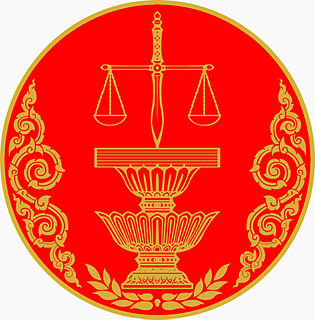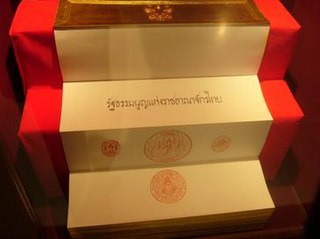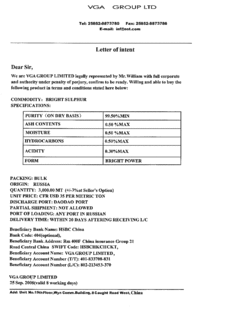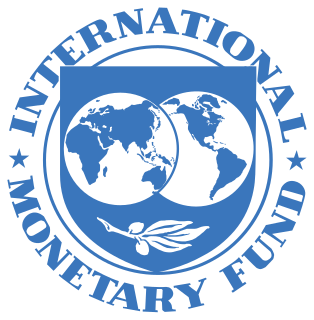Until 22 May 2014 the politics of Thailand were conducted within the framework of a constitutional monarchy, whereby the prime minister is the head of government and a hereditary monarch is head of state. The judiciary is independent of the executive and the legislative branches.

The Constitution for the Kingdom of the Netherlands is one of two fundamental documents governing the Kingdom of the Netherlands as well as the fundamental law of the European territory of the Kingdom of the Netherlands. It is generally seen as directly derived from the one issued in 1815, constituting a constitutional monarchy; it is the third oldest constitution still in use worldwide.

Bhumibol Adulyadej, conferred with the title King Bhumibol the Great in 1987(officially conferred by King Maha Vajiralongkorn in 2019), was the ninth monarch of Thailand from the Chakri dynasty as Rama IX. Reigning since 9 June 1946, he was, at the time of his death, the world's longest-reigning head of state, the longest-reigning monarch in Thai history and the longest-reigning monarch having reigned only as an adult, reigning for 70 years, 126 days. During his reign, he was served by a total of 30 prime ministers beginning with Pridi Banomyong and ending with Prayut Chan-o-cha.
The Democrat Party is a Thai political party. The oldest party in Thailand, it was founded as a conservative and royalist party, and now upholds a conservative-liberal and classically liberal pro-market position.

General elections were held in Thailand on April 2006. Elections for the lower house of the Thai National Assembly, the House of Representatives, were held on 2 April 2006 and elections for the upper house, the Senate, were held on 19 April 2006. The Constitutional Court later invalidated the House of Representatives election results and ordered a new round of voting.

In 2005 and 2006, a series of events occurred in Thailand as a result of an unrest with Thaksin Shinawatra that was supported by Sondhi Limthongkul and his coalitions. It led a military coup that concluded in the overthrow of the Thai Rak Thai government in September 2006, the flight of Thaksin after the court verdict, and the establishment of the junta government led by Surayud Chulanont, a favourite of privy councillor and senior statesman Prem Tinsulanonda.
Major General Manoonkrit Roopkachorn is a former Thai military officer, Senator and President of the Senate of Thailand. A leader of the "Young Turks" clique of military officers, he took part in the coups of 1976 and 1977, in the unsuccessful coups of 1981 and 1985, and in the 2002 corruption case of Prime Minister Thaksin.

The Constitution of the Kingdom of Thailand provides the basis for the rule of law in Thailand.

The Constitutional Court is an independent Thai court founded under the 1997 Constitution with jurisdiction over the constitutionality of parliamentary acts, royal decrees, draft legislation, as well as the appointment and removal of public officials and issues regarding political parties. The current court was established by the 2007 Constitution and is part of the judicial branch of the Thai national government.
The Council for National Security or CNS, formerly known as the Council for Democratic Reform or CDR, was the military junta that governed Thailand after staging a coup d'état against Prime Minister Thaksin Shinawatra.
Nam Yimyaem is a retired judge of the Supreme Court of Thailand, former deputy Supreme Court President, and currently chairperson of a committee investigating the assets of deposed Thai Prime Minister Thaksin Shinawatra.

The Constitution of the Kingdom of Thailand, Buddhist Era 2550 (2007) was the constitution of Thailand which was in effect from 2007 to 2014.
Party dissolution charges are a series of events and scandals that eventually led to the dissolution of the Thai Rak Thai Party, Thailand's biggest political party, and a few small parties following a general election in April, 2006.

The National Assembly of Thailand is the bicameral legislative branch of the government of Thailand. It convenes in the Parliament House, Dusit District, Bangkok.

Noppadon Pattama, Thai politician, became Foreign Minister of Thailand on 6 February 2008, in the Cabinet of Prime Minister Samak Sundaravej. He is a member of Samak's People's Power Party. He is a former legal adviser to Thaksin Shinawatra, who was deposed as Prime Minister by the September 2006 military coup.
Senate elections were held in Thailand on 29 March 2014 for the second time under the 2007 constitution. Half the senate seats were elected for non-partisan candidates under the first-past-the-post voting system, with voters electing one senator per province. Turnout fell to 43% from 56% in the 2008 senate elections and 46% in the February 2014 general election, which had been boycotted by the opposition, to only 42.51%

The history of Thailand since 2001 has been dominated by the politics surrounding the rise and fall from power of former Prime Minister Thaksin Shinawatra and the subsequent conflicts between his supporters and opponents. Thaksin and his Thai Rak Thai Party came to power in 2001 and became very popular among the electorate, especially rural voters. Opponents, however, criticized his authoritarian style and accused him of corruption. Thaksin was deposed in a coup d'état in 2006, and Thailand has since been embroiled in continuing rounds of political crisis involving elections won by Thaksin's supporters, massive anti-government protests by multiple factions, removals of prime ministers and disbanding of political parties by the judiciary, and two military coups.
The year 2014 was the 233rd year of the Rattanakosin Kingdom of Thailand. It was the 69th year in the reign of King Bhumibol Adulyadej, and is reckoned as year 2557 in the Buddhist Era. Significant events include the continuing political crisis which led to a coup d'état on 22 May.
The year 2006 was the 225th year of the Rattanakosin Kingdom of Thailand. It was the 61st year of the reign of King Bhumibol Adulyadej and is reckoned as the year 2549 in the Buddhist Era. Major events include the celebration of King Bhumibol's Diamond Jubilee, and the intensification of the 2005–06 Thai political crisis, which culminated in a coup d'état on 19 September.












